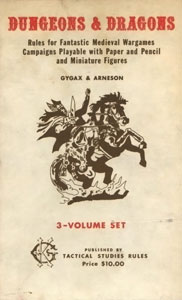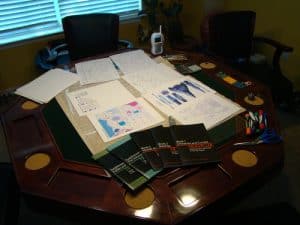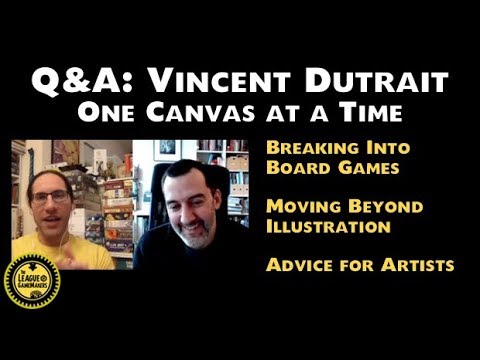
MY DAD HAS BEEN DESIGNING BOARD GAMES SINCE BEFORE I WAS BORN.
I have early memories of road rally games and bull fighting games. I remember an ongoing quest of his was to work out a three dimensional mountain climbing game that used electro-magnets. The climbers hung on to the mountain via the magnets, but they were switchable so each game could have a different configuration (à la King Oil). Needless to say games, both published and home-brew, were a part of my childhood.

D&D Bookcover on Wikipedia
One morning in 1975 my Dad told me about the new game he had played the night before. He had gone with a friend to nearby CalTech and he described how the players,
PRETENDING TO BE ELVES AND DWARVES, WORKED THEIR WAY THROUGH AN ENCHANTED COTTAGE WITH A SECRET FIREPLACE PASSAGE REPLETE WITH TRAPS BOTH MECHANICAL AND MAGICAL.
Soon after we had our own set of the white box Dungeon & Dragons rules and I was in 7 year-old heaven playing with my parents and family friends and even at a few conventions. At that time television sucked, video games were pretty much limited to Pong and the allure of a fantasy world construction kit like D&D was overwhelming. The amount of time I spent playing was dwarfed by the countless hours spent pouring over the rules and associated articles in Dragon magazine, rolling up legions of characters and drawing dungeon adventures.
As an aside, the character generation system for the space opera role-playing game Traveller was particularly attractive to me. It was a mini-game of its own in which you took your character down various paths, accumulating skills and abilities or possibly injuries. In fact it was possible for your character to die during character generation. I created dozens of characters and a universe of worlds (using another generation system) but I was only able to get anyone to play the game once.

Image of Travellers by MWChapel on RPGGeek.com
Table-top role-playing faded for me after a couple years (to reassert itself briefly in high school) due to repeated relocations, leaving the door open for the next sandbox to play in: computers. Building software would often scratch the same itch as designing a dungeon adventure, and sometimes they were one and the same. They seem like analogous systems to me – you use your imagination, ingenuity and skill to produce the best experience you can within the framework of rules and constraints of the medium.
Sometime around 2003 I got exposed to the new wave of boardgames and I was instantly hooked. I hadn’t kept up with board games much since high school, so the simplicity and elegance of games like Puerto Rico and Alhambra stood in stark contrast to my memories of day-long sessions of Advanced Civilization or Kingmaker. Before long I was working on my own designs. It’s like playing with Legos – you could play with the things other people have built, but once you perceive the building blocks underneath them who doesn’t want to tear them apart and build your own creations? Once I started the ideas just kept coming. Most of them aren’t good or don’t pan out, but they take up residence in my brain when it’s not otherwise occupied, like during my daily commute or a dull day-job meeting, and they won’t leave until they’re exorcised to paper and given their due exploration.
I am the product of my life experience. Maybe in another decade a different spell will take hold of me, but for now my brain has configured itself to require and reward the conversion of what I experience into the themes and mechanics of games. I design games because I must – my head gets too full if I don’t.








